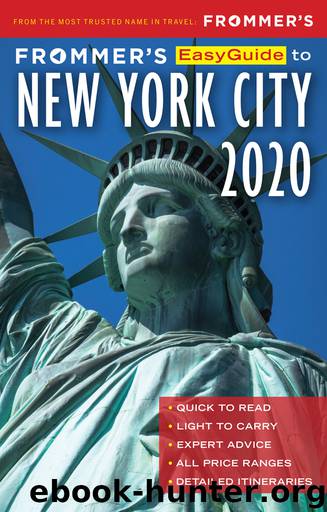Frommer's EasyGuide to New York City 2020 by Pauline Frommer

Author:Pauline Frommer
Language: eng
Format: epub
Publisher: FrommerMedia
Published: 2019-10-15T16:00:00+00:00
They had much to inspire them. Thanks to the renovation, the museum now has 60% more exhibition space, which it fills with wondrous objects from its collection, everything from a psychedelic Bob Dylan poster to a contemporary shoulder implant that looks like a crocheted snowflake (it moves inside the body with the flexibility of a sweater) to a 1.2 million-year-old scraping tool. The exhibitions are themed and always changing, so hit the website to see what’ll be there when you arrive.
2 E. 91st St. (at Fifth Ave.). www.cooperhewitt.org. 212/849-8400. Admission $18 adults, $12 seniors, $9 students, free 18 and under; $2 discount online; free Sat 6–9pm. Daily 10am–6pm (Sat until 9pm). Closed Thanksgiving and Christmas. Subway: 6 to 86th St.; 4 or 5 to 96th St.
The Frick Collection MUSEUM/HISTORIC HOME Arguably the best small museum in the nation, the Frick provides a deeply satisfying experience on a number of levels. There’s the highbrow fun of seeing some of the world’s greatest masterpieces; the lowbrow kick of getting a firsthand peek at the home of one of the super-rich and famous; and the somewhat macabre thrill, akin to a séance, of communing with someone long dead through his choices in art. In the end, the Frick Collection is as much about Henry Clay Frick and the world he created as it is about the art itself.
And that’s a good thing, as Frick (1849–1919) was a fascinating figure, an entrepreneur in the steel and coke industries with only 3 years of formal schooling, who became a self-made millionaire by the time he was 30. On his death, he bequeathed his enormous art collection and the colonnaded neoclassical mansion that housed it (built by Carrère and Hastings, architects of the New York Public Library) to the formation of a public museum for the purpose of “encouraging and developing the study of the fine arts” in the United States.
It’s not a large museum, but in each of the 16 galleries there are wonders to behold, paintings and sculptures from nearly every great artist in the Western Canon. Because Frick wanted viewers to have their own experiences of the art, there is very little wall text posted, nor is the art arranged in any “instructive” manner—different periods of art are mixed together, as are artists of various nationalities. Unlike the Barnes Collection in Philadelphia, Frick gave his trustees the right to change the arrangement of the works (see below for info on an upcoming redesign), and acquire new ones—a full third of what you’ll see was purchased after Frick passed away.
But most of the great pieces are from Frick’s era, and they are a testament to his astute taste as a collector. This is a man who not only collected Rembrandts (a trifecta of them!), he chose only the most intriguing works, such as the painter’s portrait of fur merchant Nicholas Ruts, Rembrandt’s first commissioned portrait and the one that launched his career. Masterpieces by Vermeer (three of the meager 36 that still exist today), Renoir, Degas, Velazquez, El Greco (his St.
Download
This site does not store any files on its server. We only index and link to content provided by other sites. Please contact the content providers to delete copyright contents if any and email us, we'll remove relevant links or contents immediately.
Steinbrenner by Bill Madden(814)
Uncle John's Bathroom Reader Plunges into New York by Bathroom Readers' Institute(674)
New Jersey Noir by Joyce Carol Oates(592)
Fodor's New York City 2016 by Fodor's Travel Guides(529)
Fodor's New York City (Full-color Travel Guide) by Fodor's Travel Guides(529)
Northeast Medicinal Plants by Liz Neves(526)
Long Island Noir by Kaylie Jones(501)
Manhattan Noir 2 by Lawrence Block(488)
Battle on the Hudson by Tim Sullivan(483)
Beyond Broadway Joe by Bob Lederer(467)
Fodor's New York City 2020 by Fodor's Travel Guides(461)
Minimal New York City by Michael Arndt(454)
Manhattan Noir by Lawrence Block(453)
One-Track Mind by Philip Ashforth Coppola(447)
Haunted Ohio by Charles A. Stansfield Jr(443)
Field Guide to the Natural World of New York City by Leslie Day(430)
Wall Street Noir by Peter Spiegelman(423)
My Wild Ride in Baseball and Beyond by Davey Johnson & Erik Sherman(402)
Ben Franklin's Philadelphia by Tom Huntington(387)
